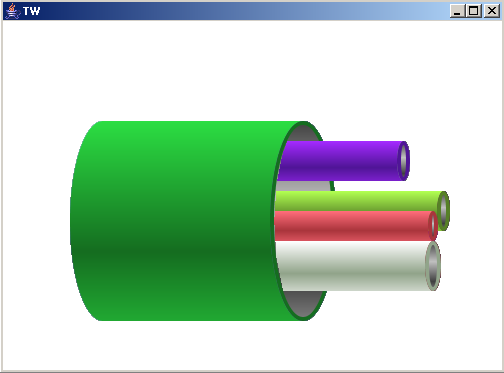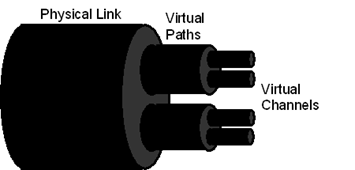一、序言
關於“Java做不好桌面”的爭論已經由來已久。雖然Swing和Java2D已經有超 過十年的歷史,也有JIDE、JGoodies、TWaver等不少開源Swing組件,但是用 Java做桌面程序仍然不是一件輕松的事。本《Java也驚艷》系列文章,就是想通 過一些簡單生動的例子,和大家一起認識Java、探索Swing。其實你只需要多一 點創意、多一點耐心,你的Java程序也可以“驚艷”!本文就帶您一起進入Java 的驚艷之旅。
二、立體套管效果
在網絡通訊中,經常要表達協議之間的“承載”關系。例如,IP協議作為高 層協議可以承載在SDH上,也可以承載在ATM協議上。同樣,IP作為協議還可以承 載更多的高層協議,例如Voice over IP,甚至電信中Everything over IP的概 念。在表現上,用相互嵌套的立體套管來表現協議的“承載”是再合適不過了( 如下圖)。

具體實現很簡單,主要代碼如下:
import java.awt.*;
import java.awt.geom.*;
import javax.swing.*;
import twaver.*;
public class PipleComponent extends JComponent {
public void paint(Graphics g) {
Graphics2D g2d = (Graphics2D) g;
g2d.setRenderingHint (RenderingHints.KEY_ANTIALIASING, RenderingHints.VALUE_ANTIALIAS_ON);
Shape parentHollowShape=createPiple (g2d,100,100,200,200,TWaverUtil.getRandomColor(),null);
createPiple (g2d,120,120,280,40,TWaverUtil.getRandomColor (),parentHollowShape);
createPiple (g2d,130,170,310,40,TWaverUtil.getRandomColor (),parentHollowShape);
createPiple (g2d,140,220,290,50,TWaverUtil.getRandomColor (),parentHollowShape);
createPiple (g2d,130,190,300,30,TWaverUtil.getRandomColor (),parentHollowShape);
}
private Shape createPiple(Graphics2D g2d,int x, int y, int width, int height,Color color,Shape parentHollowShape) {
if(parentHollowShape!=null){
Rectangle bounds=parentHollowShape.getBounds();
Rectangle rightClip=new Rectangle (bounds.x+bounds.width/2,bounds.y,3000,bounds.height);
Area clip=new Area (parentHollowShape);
clip.add(new Area(rightClip));
g2d.setClip(clip);
}
int circleWidth = height/3;
GradientPaint paint = new GradientPaint(x,
y,
color.brighter(),
x,
y + (int) (height * 0.65),
color.darker(),
true);
g2d.setPaint(paint);
Ellipse2D.Double leftCircle = new Ellipse2D.Double(x - circleWidth / 2, y, circleWidth, height);
Ellipse2D.Double rightCircle = new Ellipse2D.Double(x + width - circleWidth / 2, y, circleWidth, height);
int thickness=4;
Ellipse2D.Double rightHollowCircle = new Ellipse2D.Double(rightCircle.getX()+thickness,
rightCircle.getY()+thickness,
rightCircle.getWidth()-thickness*2,
rightCircle.getHeight()- thickness*2);
Rectangle rect = new Rectangle(x, y, width, height);
Area area = new Area(leftCircle);
area.add(new Area(rect));
area.subtract(new Area(rightCircle));
g2d.fill(area);
g2d.setColor(color.darker());
g2d.fill(rightCircle);
paint = new GradientPaint(x,
y,
Color.darkGray,
x,
y + (int) (height * 0.4),
Color.lightGray,
true);
g2d.setPaint(paint);
g2d.fill(rightHollowCircle);
g2d.setClip(null);
return rightHollowCircle;
}
public static void main(String[] args) {
JFrame frame = new JFrame();
frame.setDefaultCloseOperation (JFrame.EXIT_ON_CLOSE);
frame.setSize(800, 600);
frame.add(new PipleComponent());
frame.setVisible(true);
}
}

三、總結
本文知識要點:
漸變填充:創建 GradientPaint並設置“亮-暗-亮”的填充模式;
使用Clip:類似蒙版/剪切的Java2D技術。看看Graphics的setClip函數即可;
Area的使用:主要是Area的相交、合並等幾個常見圖形處理 手法。詳細請看java.awt.geom.Area類;
使用隨機色:這個 就太簡單了,如果有twaver.jar,可以直接使用TWaverUtil.getRandomColor() ;如果沒有,就直接new Color就行了,注意使用第四個int參數增加Alpha透明 度的變化;
如果大家感興趣,可以嘗試用上述Java2D技巧實現下圖效果 :

六、參考資料
http://java.sun.com/j2se/1.4.2/docs/guide/2d/spec/j2d- bookTOC.html
http://java.sun.com/j2se/1.4.2/docs/guid e/2d/spec.html
http://www.apl.jhu.edu/~hall/java/Java2D- Tutorial.html